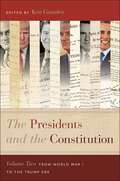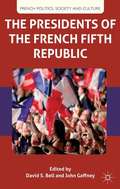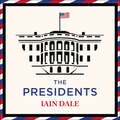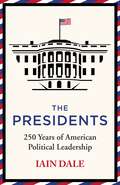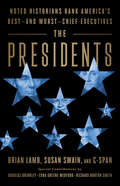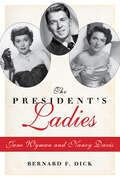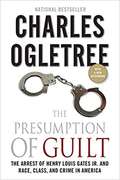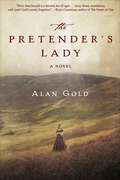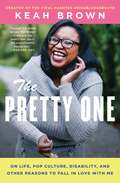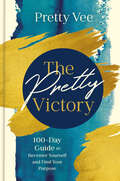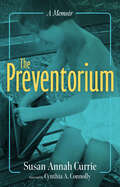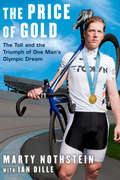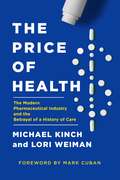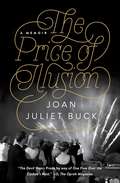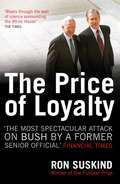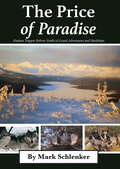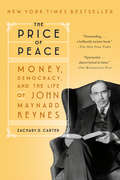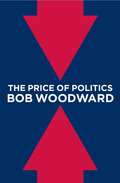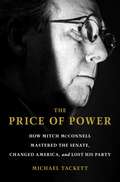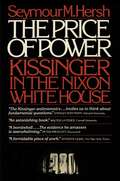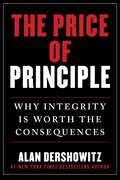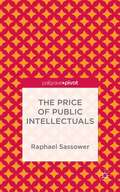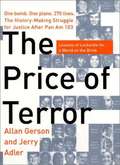- Table View
- List View
The Presidents and the Constitution, Volume Two: From World War I to the Trump Era
by Ken GormleyA revealing look at the constitutional issues that confronted and shaped each presidency from Woodrow Wilson through Donald J. TrumpDrawing from the monumental publication The Presidents and the Constitution: A Living History in 2016, the nation’s foremost experts in the American presidency and the US Constitution tell the intertwined stories of how the last eighteen American presidents have interfaced with the Constitution and thus defined the most powerful office in human history.This volume leads off with Woodrow Wilson, the president who led the nation through World War I, and ends with Donald J. Trump, who ushered the US into uncharted political and legal territory. In between, the country was confronted with international wars, the civil rights movement, 9/11, and the advent of the internet, all of which presented unique and pressing constitutional issues. The last one hundred years reveals the awesome powers of the American presidency in domestic and foreign affairs, illustrating how they have stood up to modern and novel legal challenges. The Presidents and the Constitution is for anyone interested in a captivating and illuminating account of one of the most compelling subjects in our American democracy.
The Presidents of the French Fifth Republic
by John Gaffney David S. BellIn the French Republic political leadership is normally provided by the presidency, albeit from a very narrow constitutional base. This volume examines the strengths and weaknesses of that leadership as well as the way that executive power has been established in the republican context.
The Presidents: 250 Years of American Political Leadership
by Iain DaleEssays on all 46 American Presidents who have held the office over the last 230 years - from George Washington to Joe Biden.There was a huge upsurge of global interest in US politics during the Trump presidency, culminating in the November 2020 election, the victory of the Democrat candidate Joe Biden and the subsequent, horrifying response in the storming of the US capitol. American politics is likely to remain deeply divided during the coming years, and also the focus of global attention - with Trump mobilising his base for 2024. But the transatlantic fascination with the role and office of the US President isn't new at all, and in fact reaches all the way back to the birth of the United States itself.The Presidents features essays, written by a range of academics, historians, political journalists and serving politicians, on all 46 American Presidents who have held the office over the last 230 years - from George Washington to Joe Biden. Each contributor has been carefully chosen based on expert knowledge of their subjects and personal connections, providing analysis of their subject's successes, failures and influence. Any hagiographical writing is shunned in favour of a 'warts and all' perspective on each President and the impact they've had on US politics - past, present and future.(P)2021 Hodder & Stoughton Limited
The Presidents: 250 Years of American Political Leadership
by Iain DaleThere was a huge upsurge of global interest in US politics during the Trump presidency, culminating in the November 2020 election, the victory of the Democrat candidate Joe Biden and the subsequent, horrifying response in the storming of the US capitol. American politics is likely to remain deeply divided during the coming years, and also the focus of global attention - with Trump mobilising his base for 2024. But the transatlantic fascination with the role and office of the US President isn't new at all, and in fact reaches all the way back to the birth of the United States itself.The Presidents features essays, written by a range of academics, historians, political journalists and serving politicians, on all 46 American Presidents who have held the office over the last 230 years - from George Washington to Joe Biden. Each contributor has been carefully chosen based on expert knowledge of their subjects and personal connections, providing analysis of their subject's successes, failures and influence. Any hagiographical writing is shunned in favour of a 'warts and all' perspective on each President and the impact they've had on US politics - past, present and future.
The Presidents: 250 Years of American Political Leadership
by Iain DalePolitics Home: Parliamentarians' Top Books for Christmas 2021'A must read for political geeks' - Saqib BhattiThere was a huge upsurge of global interest in US politics during the Trump presidency, culminating in the November 2020 election, the victory of the Democrat candidate Joe Biden and the subsequent, horrifying response in the storming of the US capitol. American politics is likely to remain deeply divided during the coming years, and also the focus of global attention - with Trump mobilising his base for 2024. But the transatlantic fascination with the role and office of the US President isn't new at all, and in fact reaches all the way back to the birth of the United States itself.The Presidents features essays, written by a range of academics, historians, political journalists and serving politicians, on all 46 American Presidents who have held the office over the last 230 years - from George Washington to Joe Biden. Each contributor has been carefully chosen based on expert knowledge of their subjects and personal connections, providing analysis of their subject's successes, failures and influence. Any hagiographical writing is shunned in favour of a 'warts and all' perspective on each President and the impact they've had on US politics - past, present and future.
The Presidents: Noted Historians Rank America's Best--and Worst--Chief Executives
by Brian Lamb Douglas Brinkley Susan Swain Richard Norton SmithThe complete rankings of our best -- and worst -- presidents, based on C-SPAN's much-cited Historians Surveys of Presidential Leadership. Over a period of decades, C-SPAN has surveyed leading historians on the best and worst of America's presidents across a variety of categories -- their ability to persuade the public, their leadership skills, the moral authority, and more. The crucible of the presidency has forged some of the very best and very worst leaders in our national history, along with much in between.Based on interviews conducted over the years with a variety of presidential biographers, this book provides not just a complete ranking of our presidents, but stories and analyses that capture the character of the men who held the office. From Abraham Lincoln's political savvy and rhetorical gifts to James Buchanan's indecisiveness, this book teaches much about what makes a great leader--and what does not.As America looks ahead to our next election, this book offers perspective and criteria that may help us choose our next leader wisely.
The President’s Ladies: Jane Wyman and Nancy Davis
by Bernard F. DickRonald Reagan, a former actor and one of America's most popular presidents, married not one but two Hollywood actresses. This book is three biographies in one, discovering fascinating connections among Jane Wyman (1917–2007), Ronald Reagan (1911–2004), and Nancy Davis (b. 1921–2016). Jane Wyman, who married Reagan in 1940 and divorced him seven years later, knew an early life of privation. She gravitated to the movies and made her debut at fifteen as an unbilled member of the chorus, then toiled as an extra for four years until she finally received billing. She proved herself as a dramatic actress in The Lost Weekend, and the following year, she was nominated for an Oscar for The Yearling and soon won for her performance in Johnny Belinda, in which she did not speak a single line. Other Oscar nominations followed, along with a Golden Globe for her portrayal of Angela Channing in Falcon Crest. Conversely, Nancy Davis led a relatively charmed life, the daughter of an actress and the stepdaughter of a neurosurgeon. Surrounded by her mother's friends—Walter Huston, Spencer Tracy, Katharine Hepburn, Lillian Gish, and Alla Nazimova, her godmother—Davis started in the theater, then moved on to Hollywood, where she enjoyed modest success, and finally began working in television. When she married Reagan in 1952, she unwittingly married into politics, eventually leaving acting to concentrate on being the wife of the governor of California, and then the wife of the president of the United States. In her way, Davis played her greatest role as Reagan's friend, confidante, and adviser in life and in politics. This book considers three actors who left an indelible mark on both popular and political culture for more than fifty years.
The Presumption of Guilt: The Arrest of Henry Louis Gates, Jr. and Race, Class and Crime in America
by Charles OgletreeShortly after noon on Tuesday, July 16, 2009, Henry Louis Gates, Jr., MacArthur Fellow and Harvard professor, was mistakenly arrested by Cambridge police sergeant James Crowley for attempting to break into his own home. The ensuing media firestorm ignited debate across the country. The Crowley-Gates incident was a clash of absolutes, underscoring the tension between black and white, police and civilians, and the privileged and less privileged in modern America. <p><p> Charles Ogletree, one of the country's foremost experts on civil rights, uses this incident as a lens through which to explore issues of race, class, and crime, with the goal of creating a more just legal system for all. Working from years of research and based on his own classes and experiences with law enforcement, the author illuminates the steps needed to embark on the long journey toward racial and legal equality for all Americans.
The Pretender's Lady: A Novel
by Alan GoldFrom the author of The Last Testament comes the true love of Bonnie Prince Charlie, her adventures in America and her lasting legacy. In the page-turning popular genre trail-blazed by Antonia Fraser and Phillippa Gregory, The Pretender’s Lady, Alan Gold’s meticulously researched novel, accurately opens history’s pages on a peerless woman who helped change the course of history and whose legend lives on in Scotland today--Flora MacDonald. She was the most famous Scotswoman of her day, single handedly saving Bonnie Prince Charlie. This is her fictionalized life story--her relations with the Prince, her flight to America, Ben Franklin’s influence, and her return to Britain to lobby for peace But what’s hidden from history, revealed now for the first time in Gold’s dazzling new work of fiction, is the result of Flora’s and Charlie’s love: a beautiful and talented boy raised on an American farm. But only she knows his true heritage and his claim to the world’s greatest throne. And only the genius of Ben Franklin understands how to use this naïve boy to change the history of America.
The Pretty One: On Life, Pop Culture, Disability, and Other Reasons to Fall in Love with Me
by Keah BrownFrom the disability rights advocate and creator of the #DisabledAndCute viral campaign, a thoughtful, inspiring, and charming collection of essays exploring what it means to be black and disabled in a mostly able-bodied white America. Keah Brown loves herself, but that hadn&’t always been the case. Born with cerebral palsy, her greatest desire used to be normalcy and refuge from the steady stream of self-hate society strengthened inside her. But after years of introspection and reaching out to others in her community, she has reclaimed herself and changed her perspective. In The Pretty One, Brown gives a contemporary and relatable voice to the disabled—so often portrayed as mute, weak, or isolated. With clear, fresh, and light-hearted prose, these essays explore everything from her relationship with her able-bodied identical twin (called &“the pretty one&” by friends) to navigating romance; her deep affinity for all things pop culture—and her disappointment with the media&’s distorted view of disability; and her declaration of self-love with the viral hashtag #DisabledAndCute. By &“smashing stigmas, empowering her community, and celebrating herself&” (Teen Vogue), Brown and The Pretty One aims to expand the conversation about disability and inspire self-love for people of all backgrounds.
The Pretty Victory: 100-Day Guide to Recenter Yourself and Find Your Purpose
by Pretty VeeFrom &“rising superstar&” (BET), comedic actress, and online personality Pretty Vee comes a 100-day devotional and guided journal to help you define your goals, find the strength to reach them, and unapologetically go out and get what you&’ve been dreaming of.Pretty Vee, a multi-talented comedian, actress, and philanthropist, has crafted a captivating and unique devotional blending humor, sincerity, and relatability to help make the path to spiritual enlightenment accessible and engaging for everyone. She lives by the mantra &“a delay is not a denial,&” meaning we all have hopes and dreams, but we may need a little help to get past the hurdles. She herself has faced the anxiety of not knowing how to move forward in her life, before her mother, who is a pastor, helped her recenter and find her purpose. Far too often, life pushes us to move from one task to the next, creating a perpetual cycle of doing, doing, doing without ever taking a moment to simply sit and relish our blessings. We get so caught up in the hustle that we forget to look around and be grateful for what we already have, and what we&’ve already accomplished.This 100-day devotional is meant to be a guided journal to help you reach your goals and find a deeper connection with God while prioritizing your mental and emotional health. Pretty Vee includes prompts to help you reflect on your journey towards gratitude, stillness, and speaking your truth. Her many friends and mentors, including Shaquille O&’Neal, Issa Rae, Lil Duval, Tiffany Haddish, Kierra Sheard, and Charlamagne Tha God also add their visions for a Pretty Victory.While Pretty Vee has one foot firmly in entertaining, she also sees part of her path as helping to give back. With The Pretty Victory, she shows that brokenness doesn&’t last forever. And that miracles, hope, and ultimately victories are all there for you too.
The Preventorium: A Memoir (Cultures of Childhood)
by Susan Annah CurrieNamed the 2023 Best Memoir on Health/Adverse Childhood Experiences by Memoir MagazineOpened on February 17, 1929, the Mississippi State Preventorium operated continuously until 1976. The Mississippi Preventorium, like similar hospitals throughout the country, was an institution for sickly, anemic, and underweight children. It was established on the grounds of the Mississippi State Tuberculosis Sanitorium in the early years of the twentieth century when tuberculosis was a dreaded disease worldwide. The TB Sanitorium hospital housed those with tuberculosis, offering refuge for patients of all ages afflicted with the pernicious and contagious disease. Although located on the same medical campus, the preventorium was a separate medical institution for children; no children with TB were admitted in the sixty-year run of the hospital. The name preventorium meant a place of preventing disease as there was a fear of sickly children contracting TB. The Mississippi Preventorium was one of the last, if not the very last, of these special hospitals for children. Now closed, the preventorium housed over three thousand children, including author Susan Annah Currie. In this intimate memoir, Currie details her fifteen-month stay at the preventorium. From her arrival in May 1959 at six years old, Currie vividly explores the unique and isolating world that she and children across the country experienced. Her exacting routine, dictated by the nurses and doctors who now acted as her parents, erased the distinction between patients and created both a sense of community among the children and a deep sense of loneliness. From walking silently single file through the cold, narrow halls of the hospital to nurses recording every detail of their bathroom habits to extremely limited visitation from family, Currie’s time at the preventorium changed her and those around her, leaving an indelible mark even after their return home. While many of the records from the preventorium have been lost, Currie’s memoir opens to readers a lost history largely forgotten. Told in evocative prose, The Preventorium explores Currie’s personal trials, both in the hospital and in the echoes of her experiences into adulthood.
The Price of Gold: The Toll and Triumph of One Man's Olympic Dream
by Marty Nothstein Ian DilleThe harrowing, triumphant tale of a cyclist's journey to Olympic victory and the price he paid to achieve greatness. Marty Nothstein, one of the greatest cyclists of all time, arrived at the 1996 Olympic Games a heavy favorite. In the match sprint at the Atlanta Olympics, an event akin to prizefighting on a bicycle, he raced around a banked, oval track. Nothstein lost by a hair's width on the finish line and vowed to win the gold at the next Olympics, saying, "I didn't come here for a silver medal." In The Price of Gold, Marty Nothstein eloquently and honestly tracks his journey to the games in Sydney and the events that molded him into the world's fastest man on a bicycle—from his tough-love upbringing in a blue-collar, split home, to the "borderline outlaw" cast of cycling characters who helped guide him through the ranks. "I had to become the worst, to become the best," Nothstein says of the single-minded determination that turned him into a veritable monster on his bike, but often forced him to neglect his own family. Sure to become a sports classic, this book will be published in time for the 2012 Olympics, when the world's eyes are trained on London and international conversation will turn to the question of what it takes to win the gold.
The Price of Health: The Modern Pharmaceutical Enterprise and the Betrayal of a History of Care
by Michael Kinch Lori WeimanFrom "pharma bros" to everday household budgets, just how did the pharmaceutical industry betray its own history—and how can it return to its tradition of care?It&’s an unfortunate and life-threatening fact: one in five Americans has skipped vital prescriptions simply because of the cost. These choices are being made even though we have reached a point in the conveyance of medical options where cancers can be cured and sight restored for those blinded by rare genetic disorders. How, in this time of such advancements, did we reach a point, where people cannot afford the very things that could save their lives? As the COVID-19 global pandemic has pointed out, we need the leadership of scientists, researchers, public health officials and lawmakers alike to guide us through not only in times of a global health crisis, but also during far more mundane times. For the first time in decades, people from all walks of life face the same need for medicine. It is time to discuss the tough questions about drug pricing in an open, honest and, hopefully, transparent manner. But first we must understand how we, as a society, got here. Medicines are arguably the most highly regulated—and cost-inflated—products in the United States. The discovery, development, manufacturing and distribution of medicines is carried out by an ever more complex and crowded set of industries, each playing a part in a larger &“pharmaceutical enterprise&” seeking to maximize profits. But this was not always the case. The Price of Health is the reveals the story of how the pharmaceutical enterprise took shape and led to the present crisis. The reputation of the pharmaceutical industry is suffering from self-inflicted wounds and its continued viability, indeed survival, is increasingly questioned. Yet the drug makers do not shoulder all the blame or responsibility for the current price crisis. Deeply researched, The Price of Heatlh gives us hope as to how we can still right the ship, even amidst the roiling storm of a global pandemic. How have medicines have been made and distributed to consumers throughout the years? What sea of changes that have contributed to rising costs? Some individuals, actions, and systems will be familiar, others may surprise. Yet the combined implications of these actions for will be surprising and at times shocking to both industry professionals and average Americans alike. Like so much else in human history, the history of the pharmaceutical enterprise is populated mostly by well-intended and even noble individuals and organizations. Each contributed to the formation or maintenance of structures meant to improve the quality and quantity of life through the development and distribution of medicines. And yet systems originally created to do good have often been subverted in ways contrary to the motivations of their creators. Only by understanding this disconnect can we better tackle the underlying problems of the industry head on, preventing foreseeable, and thus avoidable, medical calamities to come.
The Price of Illusion: A Memoir
by Joan Juliet BuckFrom Joan Juliet Buck, former editor-in-chief of Vogue Paris and &“one of the most compelling personalities in the world of style&” (New York Times) comes her dazzling, compulsively readable memoir: a fabulous account of four decades spent in the creative heart of London, New York, Los Angeles, and Paris—&“If you loved The Devil Wears Prada, you&’ll adore The Price of Illusion&” (Elle).In a book as rich and dramatic as the life she&’s led, Joan Juliet Buck takes us into the splendid illusions of film, fashion, and fame to reveal, in stunning, sensual prose, the truth behind the artifice. The only child of a volatile movie producer betrayed by his dreams, she became a magazine journalist at nineteen to reflect and record the high life she&’d been brought up in, a choice that led her into a hall of mirrors where she was both magician and dupe. After a career writing for Vogue and Vanity Fair, she was named the first American woman to edit Vogue Paris. The vivid adventures of this thoughtful, incisive writer at the hub of dreams across two continents over fifty years are hilarious and heartbreaking. Including a spectacular cast of carefully observed legends, monsters, and stars (just look at the index!), this is the moving account of a remarkable woman&’s rocky passage through glamour and passion, filial duty and family madness, in search of her true self.
The Price of Loyalty: George W. Bush, the White House, and the Education of Paul O'Neil
by Ron SuskindA devestating account of the inner workings of the George W. Bush administration, written with the extensive cooperation of former U.S. Treasury Secretary Paul O'Neill. As readers are taken to the very epicentre of government, this news-making book offers a definitive view of Bush and his closest advisers as they manage crucial domestic policies and global strategies within the most secretive White House of modern times.
The Price of Paradise: Alaskan Trapper Relives Youth of Grand Adventures and Hardships
by Mark SchlenkerThe Price of Paradise is a must-read for anyone who enjoys Alaskan adventure. From a childhood dream to the boreal forest, the author sets forth an unforgettable memoir of adventure and perseverance. You will feel the emotion of his successes and the pain of his failures. You will hear the howl of the wolves and shiver in the cold. You will shake your head in disbelief. You may laugh and cry, but most of all, you will know the freedom he found. My first experience with Mark and Ken was during the winter of 1982. I was flying around looking for wolves, when I came on a myriad of snowshoe trails. These trails went in every direction and covered a fairly large area. “Now, who in the world would do that?” I wondered. I met Mark the following winter when he stopped by our airstrip looking to fly over his trapping area. A friendship was born that day, which now spans over 35 years. Whether on the trapline or out hunting, we have shared some great adventures and made a lot of good memories. Mark has set forth his memories of a lifetime on the trail within the pages of this book. With his gift for story-telling, there's no doubt it will be a memorable read. Chuck McMaha-Gakona Guide Service: A legend of the Last Frontier in his own right, Mark had the best of two worlds. He spent 34 years (1988-2021) working for the Alaska Department of Fish and Game every summer, then hunting and trapping his way through the rest of the year. As a colleague and friend for the last 20 years, I can assure you that several lifetimes of riveting outdoor adventures lie between the covers of this book. I don't know if Mark had an affinity for bizarre and unusual outdoor experiences, or if those experiences had an affinity for him. No doubt, Mark's harrowing adventures, coupled with his story-telling skills, are rivaled by few. Corey Schwanke-Fisherman and Fisheries Biologist.
The Price of Peace: Money, Democracy, and the Life of John Maynard Keynes
by Zachary D. Carter&“An important, resonant, and memorable portrait&” (Jon Meacham) of world-changing economist John Maynard Keynes and the transformative ideas that outlived him &“A brilliantly wrought, beautifully written life of one of the most captivating intellects of the twentieth century.&”—Liaquat Ahamed, author of Lords of Finance At the dawn of World War I, a young academic named John Maynard Keynes hastily folded his long legs into the sidecar of his brother-in-law&’s motorcycle for an odd, frantic journey that would change the course of history. Swept away from his placid home at Cambridge University by the currents of the conflict, Keynes found himself thrust into the halls of European treasuries to arrange emergency loans and packed off to America to negotiate the terms of economic combat. The terror and anxiety unleashed by the war would transform him from a comfortable obscurity into the most influential and controversial intellectual of his day—a man whose ideas still retain the power to shock in our own time.Keynes was not only an economist but the preeminent anti-authoritarian thinker of the twentieth century, one who devoted his life to the belief that art and ideas could conquer war and deprivation. As a moral philosopher, political theorist, and statesman, Keynes led an extraordinary life that took him from intimate turn-of-the-century parties in London&’s riotous Bloomsbury art scene to the fevered negotiations in Paris that shaped the Treaty of Versailles, from stock market crashes on two continents to diplomatic breakthroughs in the mountains of New Hampshire to wartime ballet openings at London&’s extravagant Covent Garden. Along the way, Keynes reinvented Enlightenment liberalism to meet the harrowing crises of the twentieth century. In the United States, his ideas became the foundation of a burgeoning economics profession, but they also became a flash point in the broader political struggle of the Cold War, as Keynesian acolytes faced off against conservatives in an intellectual battle for the future of the country—and the world. Though many Keynesian ideas survived the struggle, much of the project to which he devoted his life was lost. In this riveting biography, veteran journalist Zachary D. Carter unearths the lost legacy of one of history&’s most fascinating minds. The Price of Peace revives a forgotten set of ideas about democracy, money, and the good life with transformative implications for today&’s debates over inequality and the power politics that shape the global order.
The Price of Politics
by Bob WoodwardSee how and why Washington is not functioning in Bob Woodward's freshly reported, thirty-five-page Afterword to his national bestseller, The Price of Politics, which provides a detailed, often verbatim account of what happened in the dramatic "fiscal cliff" face-off at the end of 2012 between President Obama and the Republicans.Now it's happening again. In fall 2013, Washington faces a new round of budget and fiscal wars that could derail the American and global economies. "We are primarily a blocking majority," said Michael Sommers, Speaker John Boehner's chief of staff, summarizing the House Republican position. It was the land of no-compromise: On health care cuts over ten years, Boehner suggested to Obama, you are $400 billion, I'm at $600 billion. "Can we split the difference here? Can we land at $500 billion?" "Four hundred billion is it," Obama replied. "I just can't see how we go any further on that." After making $120 billion in other concessions, Obama pleaded with Boehner, "What is it about the politics?" "My guys just aren't there," Boehner replied. "We are $150 billion off, man. I don't get it. There's something I don't get." The Price of Politics chronicles the inside story of how President Obama and the US Congress tried, and failed, to restore the American economy and set it on a course to fiscal stability. Woodward pierces the secretive world of Washington policymaking once again, with a close-up story crafted from meeting notes, documents, working papers, and interviews with key players, including President Obama and House Speaker John Boehner. Woodward lays bare the broken relationship between President Obama and the Congress.
The Price of Power: How Mitch McConnell Mastered the Senate, Changed America, and Lost His Party
by Michael TackettThe first definitive biography of Mitch McConnell, revealing an intimate look at the personal and political life of one of the most powerful senators in American history.In the long history of American government, few senators have wielded as much power as Kentucky&’s Mitch McConnell. That&’s no accident; he worked his entire life to cultivate his dominance. In The Price of Power, award-winning journalist Michael Tackett pulls back the curtain on one of the most influential figures to ever set foot in the American Senate, offering you an intimate, personal view of his life and career. Drawing on thousands of pages of archival materials, letters, and more than 100 interviews with associates, colleagues, and McConnell himself, Tackett pieces together the story of McConnell&’s early life, his formative battle with polio as a young child, and details his forty-plus-year career as one of the Senate&’s most impactful leaders. A lifelong Republican, McConnell was known as a pragmatic moderate legislator when he joined the Senate in 1985. Tackett traces his steady rightward drift, as McConnell&’s politics evolved with his masterful ability to consolidate and wield power. But such success comes at a cost. The Trump years brought with them the rise of an almost unrecognizable Republican party, suffused with a reactive populism that even McConnell himself would struggle to control. Featuring expert reporting, unprecedented access, and never-before-published revelations, The Price of Power is an inside portrait of exactly that—what it takes to achieve power, maintain it, deploy it, and, finally, watch it slip out of your hands.
The Price of Power: Kissinger in the Nixon White House
by Seymour M. HershFrom the introduction: "This book is an account of the foreign policy of the United States, presided over by Henry Kissinger, during Richard Nixon's first term in the White House. It is also an account of the relationship between two men who collaborated on what seemed to be a remarkable series of diplomatic triumphs. These were the years when China was reclaimed by American diplomacy; when a much-praised agreement on strategic arms limitation (SALT) was negotiated with the soviet Union; when a complex dispute in West Berlin was settled; and when American participation in the war in Vietnam, the most crucial issue facing the American presidency, was brought to a dramatic end with the signing of the Paris peace accords in January 1973, three days after Nixon was inaugurated for a second term."
The Price of Principle: Why Integrity Is Worth the Consequences
by Alan DershowitzIn his fiftieth book, The Price of Principle: Why Integrity Is Worth the Consequences, Alan Dershowitz—#1 New York Times bestselling author and one of America&’s most influential legal scholars—explores the implications of the increasing tendency in politics, academia, media, and even the courts of law to punish principle and reward partisan hypocrisy. Alan Dershowitz has been called &“one of the most prominent and consistent defenders of civil liberties in America&” by Politico, and &“the nation&’s most peripatetic civil liberties lawyer and one of its most distinguished defenders of individual rights&” by Newsweek. Yet, he has come under intense criticism for living by his principles and applying his famed &“shoe on the other foot test.&” Price of Principle is about efforts to cancel Alan Dershowitz and his career because he has insisted on sticking to his principles instead of choosing sides in the current culture and political war dividing our country. He explains that principled people are actively punished for not being sufficiently partisan. Principle has become the vice and partisanship the virtue in an age when partisan ends justify unprincipled means, such as denial of due process and free speech in the interest of achieving partisan or ideological goals. Throughout his narrative, Dershowitz focuses on three sets of principles that have guided his life: 1) freedom of expression and conscience; 2) due process, fundamental fairness, and the adversary system of seeking justice; and 3) basic equality and meritocracy. He documents the attacks on him and others like him for being &“guilty&” of refusing to compromise important principles to promote partisanship. He names names and points fingers of accusation at those who have led us down this dangerous road. In the end, Price of Principle represents an icon in the defense of free speech and due process reckoning with the challenges of unprincipled attacks—a new brand of McCarthyism—and insisting that we ask hard questions about our own moral principles.
The Price of Public Intellectuals
by Raphael SassowerThis book provides a historically-informed survey critically outlining sociological, psychological, political, and economic approaches to the role of public intellectuals. Sassower suggests how the state might financially support the essential work of public intellectuals so as to critically engage the public and improve public policies.
The Price of Terror: How the Families of the Victims of Pan Am 103 Brought Libya to Justice
by Allan Gerson Jerry AdlerWhen Libyan agents planted a bomb aboard Pan Am Flight 103, killing 259 people in the air and on the ground, America did not strike back. Instead, the grieving relatives of the victims tried to force Libya to pay for its crime through the legal system. But lawyers told the families that they could never sue Libya -- this would require changing a bedrock principle of international law, a change that every government in the world feared and would fight. Working virtually alone at first, Allan Gerson, a former diplomat and prosecutor of Nazi war criminals, spent the next eight years on the families' quest for Justice. In this high-stakes game of international power politics and legal maneuvering, there were friendships, jobs, and reputations lost, but a precious principle -- that of accountability under the law -- was strengthened and preserved. Now Gerson and his co-author, "Newsweek writer Jerry Adler, follow the threads of this extraordinary tale back to that deadly night over Lockerbie, Scorland -- and forward into a new era of international Justice, when terrorists will learn to fear the righteous retribution of their own victims.
The Price of Valor: The Life of Audie Murphy, America's Most Decorated Hero of World War II
by David A. SmithWhen he was seventeen years old, Audie Murphy falsified his birth records so he could enlist in the Army and help defeat the Nazis. When he was nineteen, he single-handedly turned back the German Army at the Battle of Colmar Pocket by climbing on top of a tank with a machine gun, a moment immortalized in the classic film To Hell and Back, starring Audie himself. In the first biography covering his entire life--including his severe PTSD and his tragic death at age 45--the unusual story of Audie Murphy, the most decorated hero of WWII, is brought to life for a new generation.
